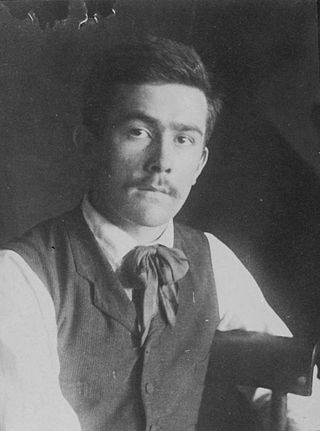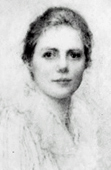
Vanessa Bell was an English painter and interior designer, a member of the Bloomsbury Group and the sister of Virginia Woolf.

William Rush was a U.S. neoclassical sculptor from Philadelphia, Pennsylvania. He is considered the first major American sculptor.

A portrait miniature is a miniature portrait painting, usually executed in gouache, watercolor, or enamel. Portrait miniatures developed out of the techniques of the miniatures in illuminated manuscripts, and were popular among 16th-century elites, mainly in England and France, and spread across the rest of Europe from the middle of the 18th century, remaining highly popular until the development of daguerreotypes and photography in the mid-19th century. They were usually intimate gifts given within the family, or by hopeful males in courtship, but some rulers, such as James I of England, gave large numbers as diplomatic or political gifts. They were especially likely to be painted when a family member was going to be absent for significant periods, whether a husband or son going to war or emigrating, or a daughter getting married.

Olive Rush was a painter, illustrator, muralist, and an important pioneer in Native American art education. Her paintings are held in a number of private collections and museums, including: the Brooklyn Museum of New York City, the Haan Mansion Museum of Indiana Art, the Indianapolis Museum of Art, Indiana and the Smithsonian American Art Museum.

Anna Claypoole Peale was an American painter who specialized in portrait miniatures on ivory and still lifes. She and her sister, Sarah Miriam Peale, were the first women elected academicians of the Pennsylvania Academy of the Fine Arts.

Horace Day, also Horace Talmage Day, was an American painter of the American scene who came to maturity during the Thirties and was active as a painter over the next 50 years. He traveled widely in the United States and continued to explore throughout his life subjects that first captured his attention as an artist in the Thirties. He gained early recognition for his portraits and landscapes, particularly his paintings in the Carolina Lowcountry.

Samuel Aloysius Murray was an American sculptor, educator, and protégé of the painter Thomas Eakins.

Adela Akers was a Spanish-born textile and fiber artist residing in the United States. She was Professor Emeritus at the Tyler School of Art. Her career as an artist spans the "whole history of modern fiber art." Her work is in the Renwick Gallery, the Metropolitan Museum of Art and the Museum of Art and Design. Her papers are at the Archives of American Art.

Lucia Fairchild Fuller was an American painter and member of the New Hampshire Cornish Art Colony. She was inspired to pursue art by John Singer Sargent. Fuller created a mural entitled TheWomen of Plymouth for the Woman's Building at the World's Columbian Exposition in Chicago in 1893. Best known for her portrait miniatures, she was a founding member and treasurer of the American Society of Miniature Painters.

Lucy May Stanton was an American painter. She made landscapes, still lifes, and portraits, but Stanton is best known for the portrait miniatures she painted. Her works are in the National Portrait Gallery in Washington, D.C., Metropolitan Museum of Art in New York, the Museum of Fine Arts in Boston, and the Philadelphia Museum of Art, where Self-Portrait in the Garden (1928) and Miss Jule (1926) are part of the museum's permanent collection.

Lydia Amanda Brewster Sewell was a 19th-century American painter of portraits and genre scenes. Lydia Amanda Brewster studied art in the United States and in Paris before marrying her husband, fellow artist Robert Van Vorst Sewell. She won a bronze medal for her mural Arcadia at The World's Columbian Exposition in 1893. She continued to win medals at expositions and was the first woman to win a major prize at the National Academy of Design, where she was made an Associate Academian in 1903. She was vice president of the Woman's Art Club of New York by 1906. Her works are in several public collections.

Sarah Paxton Ball Dodson was an American-born artist who was recognized as one of the leading American women artists in Paris during the 1880s, and whose artwork was exhibited at the World's Columbian Exposition in 1893.

Stephanie Deshpande is a contemporary American painter, best known for her portraits and narrative paintings. She currently lives in northern New Jersey.
Dorothy Caldwell is a Canadian fibre artist. Her work consists primarily of abstract textile based wall hangings that utilize techniques such as wax-resist, discharge dyeing, stitching, mark-making, and appliqué.

Gabrielle de Veaux Clements was an American painter, print maker, and muralist. She studied art at the Philadelphia School of Design for Women, Pennsylvania Academy of the Fine Arts, and in Paris at Académie Julian. Clements also studied science at Cornell University and graduated with a Bachelor of Science degree. She created murals, painted portraits, and made etchings. Clements taught in Philadelphia and in Baltimore at Bryn Mawr School. Her works have been exhibited in the United States and at the Paris Salon. Clements works are in several public collections. Her life companion was fellow artist Ellen Day Hale.

Alice Kent Stoddard (1883–1976) was an American painter of portraits, landscapes, and seascapes. Many of her works, particularly portraits, are in public collections, including University of Pennsylvania's portrait collection, Woodmere Art Museum, and other museums. She lived and painted on Monhegan Island in Maine, an enclave of artists. During World War II, she worked as a combat artist and drafted designs for airplanes. She married late in life to Joseph Pearson, who had been a friend and taught at the Pennsylvania Academy of the Fine Arts.

Edward Dalton Marchant (1806-1887), also known as Edward D. Marchant and E. D. Marchant, was an American artist. He was born in Edgartown, Massachusetts in 1806. Largely self-taught, Marchant began his career as a house painter, establishing a portrait studio in Edgartown by the mid-1820s.
Ethel V. Ashton was an American artist who primarily worked in Philadelphia, Pennsylvania. She was both a subject of noted artist Alice Neel and a portraitist of Neel. Her early works reflect the influence of Ashcan realism focused primarily on portrait painting. She was commissioned to work on the Works Progress Administration's post office mural project and has works hanging in the permanent collections of several prominent museums. By the mid-1950s she worked with abstract concepts and through the end of the civil rights era, her works synthesize both abstract and realism. She also served as the librarian of the Pennsylvania Academy of the Fine Arts from 1957 into the early 1970s.
Dewey Crumpler, is an American painter and educator. He taught at the San Francisco Art Institute (SFAI) for many years, where he held the title of associate professor.
Barbara J. Bullock is an African American painter, collagist, printmaker, soft sculptor and arts instructor. Her works capture African motifs, African and African American culture, spirits, dancing and jazz in abstract and figural forms. She creates three-dimensional collages, portraits, altars and masks in vibrant colors, patterns and shapes. Bullock produces artworks in series with a common theme and style.















